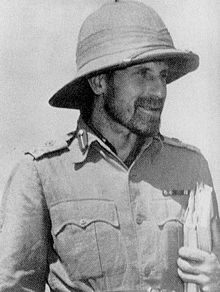Who Killed Orde Wingate?
My good friend, Prof Robert Eisenman, reminded me that he has been promoting Orde Wingate for years. Here’s a brilliant article – “Who Killed Orde Wingate?”
Excerpt of his article on huffingtonpost.com
Orde Wingate is perhaps so famous that there is no need to summarize his life. There are a plethora of good biographies, pro and con, for these purposes; but just for the argument, let us summarize a few points here. His father was first cousin to Sir Reginald Wingate, Governor of the Sudan before, during, and after the First World War and one of the key sponsors of T. E. Lawrence’s (“Lawrence of Arabia”) military activities in the Hejaz, Jordan, and Syria (Sir Reginald was mainly the supplier of the gold sovereigns Lawrence use to buy his Bedouin confreres, without which they would hardly ‘lift a finger’ as it were).
 Throughout his life, Wingate referred to him as “Cousin Rex” (it was through him too that he was later to find out that he was a distant cousin to Lawrence on his mother’s side) and at key junctures in his career was able to turn to him for a helping hand ‘up the greasy Pole’ as Disraeli was wont to call it.
Throughout his life, Wingate referred to him as “Cousin Rex” (it was through him too that he was later to find out that he was a distant cousin to Lawrence on his mother’s side) and at key junctures in his career was able to turn to him for a helping hand ‘up the greasy Pole’ as Disraeli was wont to call it.
From early youth Wingate, who was at first home-schooled because his parents wished to keep him away from pernicious influences before going as ‘a day boy’ to the famous British Public School of Charterhouse and from there to the British Military Academy at Woolwich, always felt himself “a man of destiny” — a phrase echoed in Churchill’s famous encomium to him at the end of this article — and he was, despite his ill-timed and unhappy death.
Born in India where George, his father, was a colonel and part of ‘the British Raj’; he was brought up with his numerous brothers and sisters in the extreme Evangelical and Fundamentalist Christian sect known as “the Plymouth Brethren” and, not surprisingly, always felt a kinship with Oliver Cromwell as a man destined to do great things related to the Bible, from which he always quoted liberally to his troops before going into battle — but this from the Old Testament, never the New which he felt was unrealistic and unsuited to the choice of profession he had made. The Old Testament suited him perfectly.
Encouraged by “Cousin Rex” to perfect his Arabic at London University’s prestigious School of Oriental Studies and, under his ‘tutelage’, likewise, posted to the Sudan in the late Twenties/early Thirties, he learned the ways of tracking and treating his body and his spirit hard in hunting both ivory poachers from Ethiopia and slavers from Somalia. He had previously, as a bored young officer in England after Military Academy graduation, participated in fox hunting and ultimately, steeple-chasing where he won not a few competitions and cups — developing a demeanor and attitude that was seen to be ‘utterly fearless.’ It was under these circumstances that he developed his ideas of guerrilla warfare, almost always fighting at night, knowing how to track in difficult terrain, driving both man and beast to their limits.
At the end of his service in the Sudan, he made the famous “Trek to Zerzura,” which was actually written up by him for the Royal Geographic Society, made famous by the English Patient movie and Count Laszlo Almasy, with whom “Cousin Rex” encouraged him to cooperate; but in his usual manner he made the trek alone in 1933. On the voyage home, following this show of exploration bravura and totally exhausted, he met his future wife, the lovely and charming 16-year-old Lorna, whom he was to marry two years later just as he was being posted to Palestine as an intelligence officer.
It was during “the Arab Revolt” in 1936 and, thereafter, that he encountered his true “calling” as it were, which he always knew he had — to lead a Jewish Army into battle; and, while there, many consider that he laid the foundations for the Israeli Army to come — if not totally ‘the Army,’ certainly many of its future officers like Moshe Dayan and Yigal Allon and its fighting methods. He even said as much at one of the “Training Sessions” he organized (with future Field Marshall Archibald Wavell’s blessing) in 1938, i.e., “we have come here to lay the foundations for the Jewish Army.” Of course, for most run-of-the-mill English officers, who were largely pro-Arab anyhow and against more Jewish immigration to Palestine at this crucial time, such language was blasphemous bordering on “treason” and just increased the number of enemies he always seemed to accumulate at GHQ’s.
For the full article click here.
To follow Robert Eisenman on facebook click here.

